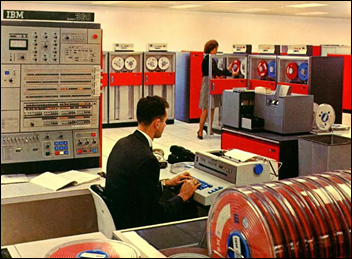Look, I want to support the author's message, but something is holding me back. Mr. Devarakonda hasn't said anything that…
Readers Write: 20th Century Man
20th Century Man
By Barry Wightman

"I work in healthcare during the day, then I go home to the 21st century."
Dave Levin, MD, founder/CEO of Tres Rios Group (@DaveLevinMD), uttered these stinging words at last week’s OnBase + Epic User Forum in Cleveland. Thanks to our friends at Nordic Consulting (@Nordicwi), who tweeted this in real time on the jungle network raising, I’m sure, a knowing smile on many a grey-haired regular Joe technology type such as myself in health IT-land. Now, I’m not here to comment Dr Levin’s presentation, but with that tasty, snarky comment, he hit on something I’ve been wanting to get off my chest for a while now.
It’s all déjà vu all over again.
And it starts with an old Kinks song.
No, really.

Good old Ray Davies, on the fine Muswell Hillbillies elpee of 1971, sang, “I’m a 20th century man but I don’t want to be here….” (cue chiming guitars and thumping drums.)
And here we are in healthcare’s 2014 and those words still ring true. And we’re faced with vast data centers that don’t interoperate well, processes and workflows that haven’t changed much since, well, let’s say the ‘90s.
Some folks complain about EHRs, saying they’ll never work – which is like attacking the telephone as a useless gadget in 1910. Yes, healthcare is conservative, slow to change, and it is a vast, terribly complex industry. But still.

See, I come out of the high-end computing and communications world of the last 40 years and we all know about the technology revolutions that came out of that time.
And it all had to do with the decentralization of power.
Power to the people.
Here’s what happened:
- Big iron, mainframe computing was overthrown, or, at least changed forever by personal computing. The data center data processing IT gatekeepers of the ‘60s/’70s, the men in the white coats (not docs) lost their complete control. Big mainframe data centers were then called “glass houses” – complex and unknowable, sealed safely away from the actual user rabble. Then user peasants with pitchforks began throwing rocks.
- Distributed processing was invented in the ‘70s/‘80s – in which mini computers and personal computers were bought by company departments, who, fed up by the long delays and general stick-in-the-mudness of corporate IT, took matters into their own hands. Lotus 1-2-3! Excel! WordPerfect! Soon, IT was surrounded. Some bit of chaos ensued. Luddites were outraged.
- Interoperability became an issue. Can I get my 1980s IBM 3081 mainframe or Cray supercomputer to talk with all these blazingly fast minicomputers and those crazy PCs and their newfangled servers? Can I get this application to communicate with that application on a batch or maybe even real-time basis? Will this data jive with that data? Oh man. There was even a huge Silicon Valley trade show called Interop. Big business. You can look it up.
And, over time, it all began to work. Standards emerged: TCP/IP, the Open Systems Interconnection (OSI) Model, designed to facilitate application-to-application communications. Forums and user groups were founded. Requests for comments solicited. Hardware and software vendors cooperated. Open systems mostly won. Proprietary systems mostly lost. Not bad.
And new business empires were built. Microsoft, Cisco, Apple, and an endless army of startups who followed in their wake disrupted markets as they went, changing the world.
Fast forward to now. Healthcare. We’ve been there before.
Thing is we’re still there. Maybe about 1990. EMR/EHR monsters have emerged: Epic, athena, Cerner, et al. The big payors – you know the list. Crazy startups in new markets are bubbling under – population health, mhealth. And there are user revolutionaries out there – visionary clinics and system departments who are moving ahead on their own, confounding CIOs and IT (with whom I have much sympathy – which reminds me of another old tune).
And just like in 1990, with the World Wide Web just around the corner, then gestating in gov, mil, and edu domains, everything changed.
And we won’t have to live in the 20th century with the Kinks. (Not that that’s a bad thing.)
And Dr. Dave Levin will be happy.
And so will we.
It’s gonna happen.
Barry Wightman is VP of marketing of Forward Health Group of Madison, WI and the author of Pepperland.


Love the kinks and love that quote!
Great quote! Who is the Dr Levin guy?
Recently realized the bashing of healthcare IT engineering types for poor interoperability is like blaming musicians for a horrible music industry. There are plenty of incredible healthcare tech people and there are plenty of incredible musicians. In both cases there are few incentives to make the best rise to the top. Case in point: getting calendars to reliably sync between Microsoft Exchange/Outlook and Apple iOS/iPhone. Making it happen has been technically feasible for years. But neither company is customer-focused enough or humble enough to allow the engineers to make it work.
I respectfully request you to retract your bash, or at least modify the bash to focus on poorly aligned incentives in markets rather than on the hard-working engineering types.
Don’t retract a thing! Perfect!